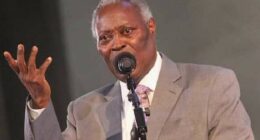
The former Governor of the Central Bank of Nigeria (CBN), Godwin Emefiele, has escalated his legal battle to reclaim control over a sprawling estate in Abuja, comprising 753 housing units. Emefiele has filed a petition with the Court of Appeal in Abuja, seeking to overturn a recent judgment that granted the federal government full ownership of the significant property located in the Lokogoma district.
The Economic and Financial Crimes Commission (EFCC) had previously secured a court order to confiscate the estate, which was initially linked to an unnamed former government official. However, Emefiele, through his counsel A.M. Kotoye, contends that he possesses a vested interest in the property and should have been included in the forfeiture proceedings. He is now urging the Appeal Court to annul the lower court’s decision.
Emefiele asserted his unawareness of the forfeiture proceedings, claiming the EFCC published the interim forfeiture notice in an obscure section of a newspaper, making it difficult to detect. He further explained that his simultaneous involvement in three other criminal cases in Abuja and Lagos hindered his ability to notice the publication. Emefiele also alleged that the EFCC intentionally concealed the forfeiture case from him while actively engaging with him on other charges.
The trial court, however, dismissed Emefiele’s arguments, ruling that the EFCC had followed due process and that the newspaper notice was adequate. The judge stated that the notice “could not reasonably be characterised as concealed.”
Undeterred, Emefiele lodged his appeal on April 30, 2025, seeking the Court of Appeal to:
Overturn the judgment issued on April 28, 2025.
Annul the interim and final forfeiture orders dated November 1 and December 2, 2024, respectively.
Approve his application submitted on January 28, 2025.
He maintains that the trial court misinterpreted his application and erroneously dismissed it without proper consideration of crucial facts, arguing that the forfeiture orders were based on “hearsay, suspicion, and insufficient evidence.” Emefiele also asserted that he holds both legal and equitable interests in the estate, a claim the trial court disputed, citing a lack of ownership evidence from his side.
“The entire ruling is a miscarriage of justice,” Emefiele declared, adding that “The failure of the trial judge to properly evaluate the affidavit and documents before him is perverse and has caused a miscarriage of justice. The orders were made in breach of the 1999 Constitution and are therefore null and void.�
In a related development, Emefiele�s legal team has written to the Minister of Housing, formally requesting that the government halt all plans to sell the estate until the ongoing appeal is resolved. “We are aware that the properties may soon be sold to the public. We have already served the EFCC with a notice of appeal and an injunction,” the letter stated. This comes amidst recent announcements by the federal government regarding its intention to auction the estate to low- and middle-income Nigerians.







